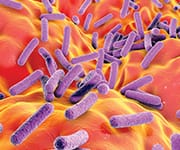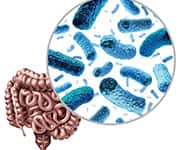LIFE EXTENSION MAGAZINE
No one likes to talk about it, but about 15% of Americans experience constipation on an ongoing basis. It can be unpleasant and uncomfortable.
Constipation increases with age, affecting approximately 34% of women and 26% of men 65 years and older.1
The risks go well beyond discomfort.
A 2019 study found that constipation is associated with a higher risk of stroke, coronary heart disease, and all-cause mortality.2
Changes to the gut microbiota associated with constipation might be related to atherosclerosis, a rise in blood pressure, and cardiovascular events.3
There’s a unique way to counter those changes: a targeted probiotic strain that reduces constipation.4
For those who need immediate relief combinations of magnesium + vitamin C or potassium + magnesium + vitamin C are effective while providing the body with healthy nutrients.
Health Issues Linked to Constipation
Constipation can make life miserable. It’s associated with a higher risk of heart disease, stroke, and overall mortality, as well as to a disrupted microbiota that may have negative effects throughout the body.2,6
Constipation is also linked to a higher risk of cancer. This may be due to increased inflammation or prolonged contact between stool carcinogens and the tissue lining the colon.5
A Probiotic Solution
Scientists focused on the beneficial bacteria known as probiotics as a possible solution.
After investigating more than 2,000 probiotic strains, scientists identified several strains derived from yogurt produced in New Zealand that had probiotic value and the ability to survive conditions similar to those in the human digestive tract.7
Of these, one specific strain decreased colonic transit time, the time it takes for food to move through the colon. This probiotic is Bifidobacterium lactis HN019.4
By moving stool along faster, scientists believed that this probiotic could help relieve existing constipation and many symptoms often associated with it, such as abdominal pain and gas.4
Clinical Study of Constipation
In a clinical trial of patients with moderate constipation, daily use of a unique probiotic for two weeks led to a:4
- 42% decrease in constipation,
- 52% decrease in abdominal pain, and
- 48% decrease in nausea.
In addition to restoring regularity, this probiotic could help prevent some of the long-term health effects associated with constipation.
Impressive Clinical-Trial Results
To validate their hypothesis, scientists set out to test B. lactis HN019 in a clinical trial.4
A total of 88 men and women ages 25 to 65 were divided randomly into three groups:4
- One group took 1.8 billion colony-forming units (CFU) of B. lactis HN019 once daily,
- Another took 17.2 billion CFU of B. lactis HN019 once daily, and
- A third group took a daily placebo.
After 14 days, compared to the placebo group:4
- Those who took the lower B.lactis dose had colonic transit times that were 18.5 hours faster, an improvement of 31%.
- Those who took the higher daily dose of 17.2 billion CFU of B. lactis had colonic transit times that were 28.1 hours faster, an improvement of 57%.
What You Need to Know
Safe, Quick Constipation Relief
- Scientists have identified a probiotic strain, Bifidobacterium lactis HN019, that relieves ongoing constipation—without side effects.
- In a clinical trial, oral use of B. lactis HN019 decreased colonic transit time by up to 57%, eased nausea and abdominal pain, and effectively restored normal bowel regularity in just two weeks.
- In addition to reducing quality of life, chronic constipation may be associated with serious health issues, including higher rates of heart disease, cancer, and all-cause mortality.
For Immediate Relief
Life Extension long ago published a solution for constipation caused by insufficient peristalsis.
The term peristalsis refers to a series of organized muscle contractions that moves food through the digestive tract.15
Insufficient or ineffective peristalsis means there is not enough colon contractile activity, or the activity does not occur in the necessary rhythmic pattern needed to completely evacuate one’s bowels.
The encouraging news is that if one drinks the proper nutrient mix on an empty stomach (usually first thing in the morning), a surge of peristalsis will occur within an hour that cleans out most or all fecal matter.
The most popular nutritional powders used for this purpose contain vitamin C with magnesium and/or potassium.
It is important to drink at least one to two glasses of water (8 to 16 ounces) after taking these powdered nutrient mixes as they will draw water from surrounding tissues into the colon to facilitate passage of feces.
By increasing the volume of water in the intestine in combination with nutrients that stimulate peristalsis, stools are softened, intestinal muscle contraction is stimulated, and bowel evacuation is prompted.
The most popular formula our customers use is a low-cost effervescent buffered blend comprised of vitamin C + magnesium + potassium.
Those with chronic kidney disease should not take the high doses of magnesium and potassium used to stimulate peristalsis. This is especially relevant to those with advanced kidney disease (stages 3 and 4).
Maintaining sufficient intake of magnesium and potassium, however, is critical for all individuals.
Subjects taking the higher dose improved their slower-than-normal colonic transit times into the normal range—within just two weeks.
Digestive discomfort questionnaires completed by the participants showed that in the higher-dose probiotic group the symptom frequency was, on average:4
- For constipation, decreased 42%,
- For abdominal pain, decreased 52%, and
- For nausea, decreased 48%.
Taking this probiotic did not result in any adverse effects.4
How the Probiotic Works
Studies have provided insight into how B. lactis HN019 may be able to reduce colonic transit time.4,8,9
Certain types of bacteria in the digestive tract act on food in the digestive tract, producing short-chain fatty acids, which are a source of energy for cells lining the colon. These fatty acids are essential to optimal gastrointestinal health.
Preclinical models have demonstrated that short-chain fatty acids interact with a protein within certain cells that exist alongside intestinal epithelial (surface) cells. This sets in motion a cascade of events that speeds up colonic transit times.4,9-11
A clinical study also revealed that use of B. lactis HN019 increased levels of two other beneficial bacteria, bifidobacteria and lactobacilli, and decreased levels of harmful enterobacteria.12
The net result of this gut microbiota rebalancing may be stimulation of peristalsis (the muscle contractions that move food through the digestive tract) and a shortening of colonic transit time.4
More Effective than Constipation Drug
Scientists at Life Extension compared this probiotic’s clinical results to those of a prescription constipation medication called prucalopride.
They reviewed multiple clinical studies of pruca-lopride.13
Reviewers found that prucalopride improved colonic transit times by 20%,13 far less than the 57% improvement seen in the high-dose B. lactis HN019 trial.4
Prucalopride has been associated with multiple side effects, including headaches, abdominal pain, nausea, and diarrhea,14 compared to no adverse side effects with the probiotic.4
This probiotic strain shows greater effectiveness at relieving and preventing constipation than a major prescription drug. This can help prevent serious, long-term health effects.
Summary
Constipation afflicts about a third of people over 60. Beyond the discomfort and unpleasantness, there is even some thought that constipation may have an association with heart disease, cancer, and other serious health risks.
Clinical research showed that taking the probiotic strain Bifidobacterium lactis HN019 decreased colonic transit time by up to 57%, safely restoring regular bowel movements within two weeks.
If you have any questions on the scientific content of this article, please call a Life Extension Wellness Specialist at 1-866-864-3027.
References
- Available at: https://www.uptodate.com/contents/etiology-and-evaluation-of-chronic-constipation-in-adults. Accessed May 9, 2022.
- Sumida K, Molnar MZ, Potukuchi PK, et al. Constipation and risk of death and cardiovascular events. Atherosclerosis. 2019 Feb;281:114-20.
- Ishiyama Y, Hoshide S, Mizuno H, et al. Constipation-induced pressor effects as triggers for cardiovascular events. J Clin Hypertens (Greenwich). 2019 Mar;21(3):421-5.
- Waller PA, Gopal PK, Leyer GJ, et al. Dose-response effect of Bifidobacterium lactis HN019 on whole gut transit time and functional gastrointestinal symptoms in adults. Scand J Gastroenterol. 2011 Sep;46(9):1057-64.
- Sundboll J, Thygesen SK, Veres K, et al. Risk of cancer in patients with constipation. Clin Epidemiol. 2019;11:299-310.
- Kubota Y, Iso H, Tamakoshi A. Bowel Movement Frequency, Laxative Use, and Mortality From Coronary Heart Disease and Stroke Among Japanese Men and Women: The Japan Collaborative Cohort (JACC) Study. J Epidemiol. 2016 May 5;26(5):242-8.
- Prasad J, Gill H, Smart J, et al. Selection and Characterisation of Lactobacillus and Bifidobacterium Strains for Use as Probiotics. International Dairy Journal. 1998 1998/12/01/;8(12):993-1002.
- Salminen S, Salminen E. Lactulose, lactic acid bacteria, intestinal microecology and mucosal protection. Scand J Gastroenterol Suppl. 1997;222:45-8.
- Reigstad CS, Salmonson CE, Rainey JF, 3rd, et al. Gut microbes promote colonic serotonin production through an effect of short-chain fatty acids on enterochromaffin cells. FASEB J. 2015 Apr;29(4):1395-403.
- Essien BE, Grasberger H, Romain RD, et al. ZBP-89 regulates expression of tryptophan hydroxylase I and mucosal defense against Salmonella typhimurium in mice. Gastroenterology. 2013 Jun;144(7):1466-77, 77 e1-9.
- Spohn SN, Mawe GM. Non-conventional features of peripheral serotonin signalling - the gut and beyond. Nat Rev Gastroenterol Hepatol. 2017 Jul;14(7):412-20.
- Ahmed M, Prasad J, Gill H, et al. Impact of consumption of different levels of Bifidobacterium lactis HN019 on the intestinal microflora of elderly human subjects. J Nutr Health Aging. 2007 Jan-Feb;11(1):26-31.
- Emmanuel A, Cools M, Vandeplassche L, et al. Prucalopride improves bowel function and colonic transit time in patients with chronic constipation: an integrated analysis. Am J Gastroenterol. 2014 Jun;109(6):887-94.
- Available at: https://www.mayoclinic.org/drugs-supplements/prucalopride-oral-route/side-effects/drg-20452343?p=1. Accessed May 5, 2022.
- Available at: https://medlineplus.gov/ency/article/002282.htm. Accessed May 11, 2022.







